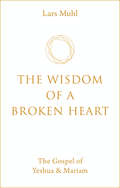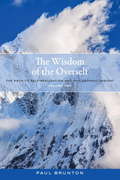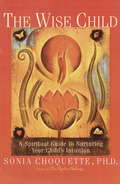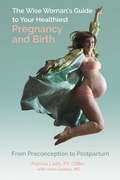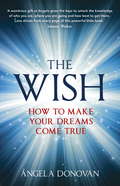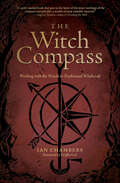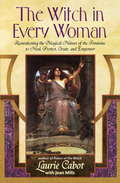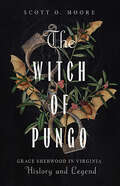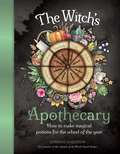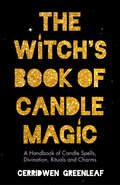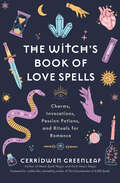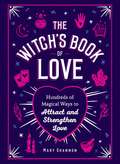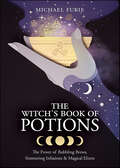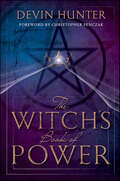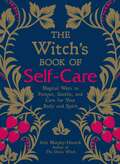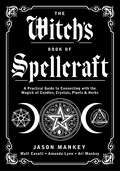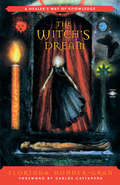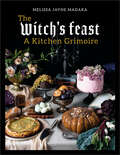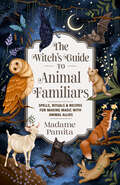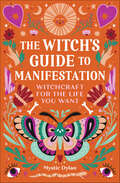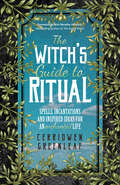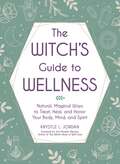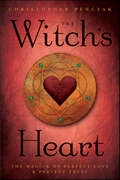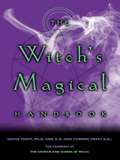- Table View
- List View
The Wisdom of a Broken Heart
by Lars MuhlIn this gift book from renowned spiritual teacher Lars Muhl we learn that the vast majority of us will experience emotional pain in our lives but that it's possible to use that pain as a unique opportunity for spiritual growth. The perfect book for improving your self-care or as a gift for someone you love.The Wisdom of a Broken Heart is a beautifully designed hardback gift book with profound content that draws on Lars Muhl's many years of spiritual studies and experiences. In a time when we as humans are being challenged in many ways, Lars stresses that it is through the pain suffered by so many of us, and by understanding the deeper meaning of that pain, that we are given a unique opportunity for a breakthrough at the spiritual plane. Arranged in verse form, the book contains the essence of the secret teachings taught by Yeshua (Jesus) the Nazarene and Mariam (Mary) Magdalene 2,000 years ago. Over the years, the teachings have been revealed in fragments and scattered glimpses; this book now creates a synthesis of the beautiful wisdom of the complete human being. Topics range from the profound energetic exchange that occurs between two lovers (with visualizations to meet Yeshua if you identify as a woman or Mariam if you identify as a man), to using mantras, song and dance in order to reach divine awareness, to numerology and other symbolism. Ultimately, this is a complete guide to living the Law of Light for the benefit of yourself and the wider world. As Lars says: "We are all potential healers, and if there is anything the world needs right now, it is exactly healers."
The Wisdom of the Overself
by Paul BruntonInspired by Paul Brunton's years spent with sages in Asia, The Wisdom of the Overself and its companion volume The Hidden Teaching Beyond Yoga were written at the request of these remarkable teachers, who recognized that Brunton had a significant role to play in the transmission of traditional wisdom to the West. Here is a profound re-creation of these teachings, brought to life and made accessible by Brunton's insights. In print since the 1940s, Brunton's works are considered to be among the most comprehensive, clear, and practical guides on the path to enlightenment. Brunton unfolds the grand vision for human development by investigating consciousness as the source of all experience; how to move from ego-centered life to the transcendent reality; the interplay of karma, free will, and grace; the nature of evil and suffering; how to awaken intuition and penetrative insight; the passage through death to rebirth; and psychic experiences and mystic visions. He also provides seven ultramystic exercises to open the door to higher consciousness, including a healing meditation on the sun; practices for transforming the future, dream, and sleep; and a meditation on the timeless self. These techniques lead to the deepest spiritual realizations--to the true "Wisdom of the Overself."This new edition has been updated to incorporate Brunton's final revisions. It includes a new foreword plus supplementary reading material selected from the author's archives by the Paul Brunton Philosophic Foundation.ContentsForeword by the Paul Brunton Philosophic Foundation 1. Prefatory 2. The Meaning of Mentalism 3. The Birth of the Universe4. Studies in Dreams5. The Metaphysics of Sleep6. The Secret of the "I"7. The Scorpion of Death8. The Immortal Overself 9. The Shadows of Evil and Suffering10. The War and the World11. The World-Mind12. The Unveiling of Reality 13. Initiation into Mystical Experience 14. The Yoga of the Discerning Mind 15. The Mystical Phenomena of Meditation 16. Some Fruits of PhilosophyAppendix: Additional Resources from The Notebooks of Paul Brunton, Compiled by the Paul Brunton Philosophic Foundation EditorsFrom the Trade Paperback edition.
The Wise Child: A Spiritual Guide to Nurturing Your Child's Intuition
by Sonia Choquette"Connecting to our intuition unites us with both our soul and the soul of the Universe, Divine Spirit. It takes away our fearful sense of isolation and inadequacy. It replaces fear with a sense of spiritual direction and safety. The world becomes friendly, nonadversarial, and welcoming. Life becomes joyful, amusing, generous, and abundant. This is the divine plan. The intuitive life is one of confidence, inner peace, and creative expression. What better gift to ourselves and our children?" How can I help my children to thrive and prosper? How can I ensure that they will not become unhappy and frustrated as I have been? These are the questions that inspired Sonia Choquette to write this profound and accessible book explaining--through spiritual principles, modern-day parables, and practical exercises--how even busy parents can help children connect to their own source of divine guidance.
The Wise Woman's Guide to Your Healthiest Pregnancy and Birth: From Preconception to Postpartum
by Patricia LadisA fresh, new pregnancy guide—the first complete functional medicine book—offering women and their partners a comprehensive approach to maintain and enhance health and wellness before, during, and after pregnancy.The Wise Woman&’s Guide to Your Healthiest Pregnancy and Birth combines the expertise of top-tier physical therapist Patricia Ladis—who works with superstar athletes, professional dancers, and celebrities—with Dr. Anita Sadaty, a highly regarded holistic ob-gyn with a celebrity clientele. Together, they have devised a six-step protocol beginning the six months before conception continuing forty days post-birth and beyond, incorporating holistic principles that encourage optimal wellness for mother, partner, and baby. Whether they are in their 20&’s, 30&’s or 40&’s, this book empowers readers to be in tune with their bodies during all stages of pregnancy, and is the first book by a functional medicine dream-team aligning medical and structural body issues to avoid such potential pregnancy outcomes as osteoporosis, sciatica, pelvic prolapse, structural weakness, and postpartum depression. Each of the six stages organizes Ladis and Sadaty&’s holistic principles into five easy-to-follow aspects: Body, Movement, Breathing, Nourishment, and Wisdom. They include practical applications such as foods to help reduce internal inflammation, specific exercises—with instructive photos—in each stage, breathing techniques to lower stress, and &“pearls of wisdom&” backed by science exploring a multicultural history of this special time in a woman&’s life. For the first time, a pregnancy guide considers the importance of choices you make six months prior to conception, and the effect on genes. When both members of a couple are calm, fit, and well-nourished, the latest science suggests that together they are less likely to pass on negative genes to a child.
The Wish: How to make your dreams come true
by Angela DonovanNo matter who you are or where you've come from, you have your own special dreams. But how can you make your dreams come true? How do you find that special job, person, or place where you can thrive? And how do you know what you wish for is right for you? How can you be sure it won't end up delivering more of the same, or making life worse? The Wishanswers these questions and more.Dreams require imagination, intention and passion. They also require a lot of energy to give them lift-off. The Wish shows you how to boost your life energy so your wishes have enough impetus needed to happen. Learn how to let go self-doubt, and use your words and thoughts in powerful new ways.What makes The Wish so amazing that it also gives you the tools uncover the real you. Discover how to read the big picture and make sense of the detail. Find out which dreams are in your best interest and those that are not. Learn how to locate, recognise and overcome your deepest fears. Uncover your unique passions and talents, and find out how they can deliver the life you long for. Discover your heart/soul connection and what it reveals about your true destiny. Learn how to create genuinely good vibes around you that will draw great people and situations your way with ease. Find out why giving is essential to creating an abundant life.It seems miraculous this wisdom has emerged at a time when so many are fearful and hold little hope for their future. The thing about The Wish is that it takes care of all your anxiety and shreds it. In its place it puts strength, hope, and peace of mind. And it shows you how to build on these qualities to make your dreams come true.
The Witch Compass: Working with the Winds in Traditional Witchcraft
by Ian ChambersExperience the Witch Compass: Your Vehicle, Map, and DestinationExplore the compass of the eight winds, a magical circle at the heart of Traditional Witchcraft. More than a tool for protection or raising power, this framework provides the ritual means to traverse the worlds and a mythic landscape that can be accessed at any point in time and space. Traditional Witch Ian Chambers teaches how the Witch Compass represents an entire worldview, a cosmological map, and a method for magic and revelation. He helps you develop your own compass and use it for divination, spirit work, and practical sorcery. This book shows you the world through the lens of your Witch Compass and reveals the many realms and spirits available to you.
The Witch in Every Woman
by Laurie CabotCreate the life you seek. . . discover a pathway to the powers within.All women possess the primal courage and strength of the Witch. In this breakthrough, life-altering new book, Laurie Cabot brings more than forty years of experience as a spiritual counselor and practicing Witch to cultivate and celebrate the secret, magical side of every woman's nature. Unfolding the wit and wisdom of ancient Celtic tales, as well as many stories of her own making, Laurie shows you how ancient truths can empower you during many of life's dark moments and lead you on a path of success and personal fulfillment. Through story, ritual activity, and spiritual communion, you will learn how to use your instinctual nature to achieve your goals and feel energized, strong, and capable in your daily life.Explore how to: Increase sexuality and bring into your life, and heart, the love you long for Uncover hidden strengths and overcome fear Protect yourself and loved ones from physical harm, deception, or betrayal Retrieve your inborn talent to heal ailments and diagnose disease Unleash creativity Enhance communication skills Sharpen your intuition about others and the world around you Enjoy healthy, productive dreams
The Witch of Pungo: Grace Sherwood in Virginia History and Legend
by Scott O. MooreThe authoritative cultural history of Virginia&’s most famous accused witch In 1706, Grace Sherwood was &“ducked&” after her neighbors in Princess Anne County accused her of witchcraft. Binding and throwing her into the Lynnhaven River, they waited to see whether she would float to the top (evidence of her guilt) or sink (proof of her innocence). Incredibly, she survived. This bizarre spectacle became an early piece of Virginia folklore as stories about Sherwood, the &“Witch of Pungo,&” spread. Her legend still looms large in Tidewater. In 2006, Governor Tim Kaine even issued an informal pardon of Sherwood, read aloud by the mayor of Virginia Beach before the annual reenactment of Sherwood&’s ducking. This is the first book to explore Grace Sherwood&’s life and cultural impact in depth. Anyone interested in colonial Virginia, American folklore, and the history and legacy of witch trials will find much to enjoy in this spellbinding book.
The Witch's Apothecary: How to make magical potions for the Wheel of the Year
by Lorriane AndersonBestselling author of The Seasons of the Witch Oracle cards series, Lorriane Anderson, has created a practical guide for beginning and advanced witches to unlock the greater powers of making your own apothecary blends. Lorriane owns and operates her own successful, soul-based apothecary and uses her own practices to teach you how to make potions based on your needs, intentions, and energy.A sacred living lifestyle is like slow living, and spiritually infused and focused on mindfulness, magic and self-care. Learn to craft magical blends that carefully follow the Wheel of the Year. You will feel empowered to craft your own formulas for personal use, experiment, and work from nature to create magical blends which tie into sacred sabbat days and tip into your magical energy.Imagine creating your own candle to improve and appreciate Abundance in your life. Or creating an incense to clear blocks in your life to love.Learn about the various ingredients, practices, and exercises needed to begin your magical journey and start your own witchy apothecary. You will also find a selection of over 100 recipes associated with each of the sabbats in the Wheel of the Year, and instructions on how to deepen your connection with nature through these seasonal cycles.
The Witch's Book Of Days
by Yvonne Owens Jean KozacariThe Witch's Book of Days is designed to serve as a year-and-a-day self initiation schedule. The organization of the year into four major segments between major holidays corresponds each of the segments to a characteristic element, direction, and magical tool.
The Witch's Book of Candle Magic: A Handbook of Candle Spells, Divination, Rituals and Charms
by Cerridwen GreenleafA Candle Magic Book for Beginner and Professional WitchesCandles are an essential part of a witch’s spiritual practice. Candle work is not only easy and accessible for witches across a variety of ages and levels of experience, but it's also one of the most powerful tools in the realm of magic.Learn both basic and intricate candle spells like a pro. Candle magic is special because it combines two essential elements: light and color. This makes these spells perfect for setting intention and divination, as well as being an essential for every witch’s altar display. This book, complete with candle spells, incantations, and rites, consolidates the scope of magic that can be performed utilizing candles to offer practical uses for readers.Find hope and healing through this spell book. Complete with knowledge and wisdom from best-selling author Cerridwen Greenleaf, you can learn how to choose the perfect candles for your practice, consider the properties of various colors and shapes, and learn a variety of candle spells and practices —inviting in peace, love, and prosperity to enhance your life.Inside Witch’s Book of Candle Magic, you’ll learn:What it means to “charge” your candle, and how to do soWhat different color candles represent during your ritualsHow to make your own candleNumerous types of wiccan spellsIf you liked Candle Magic for Beginners, Book of Candle Magic, or Wicca Book of Candle Spells, you’ll love Witch’s Book of Candle Magic.
The Witch's Book of Love Spells: Charms, Invocations, Passion Potions, and Rituals for Romance
by Cerridwen GreenleafA Moon Spells Book with Love Spells for True Romance“The perfect resource for spell casting, rituals as well as deities and flowers”—Pegan Pages MagazineThe Witch’s Book of Love Spells is a moon spells book to help you say “I’ve finally found the love of my life!” Love can come in many ways, and love spells help to cultivate your greatest love, deepest romance, and truest desires.A spell book for witches full of love and magic. Witchcraft is based on the knowledge that our destinies lie in our own hands, even in matters of the heart. Why suffer love gone wrong when you can do something about it? Don’t doubt your power—with the help of this simple moon spells book, some gemstones and crystals, herbs for love, and a little of your natural chemistry, you are irresistible.Love spells that harness the moon. Magic influences desired outcomes, empowers, and fosters growth. Begin this process with love spells—spells that draw the attention and devotion of a lover, strengthen the union between an existing couple, invoke sexual magic, heal a broken heart, and fill your own heart with love and compassion for yourself.Inside this moon spells book, you’ll find:Secret recipes for aphrodisiacsRitual celebrations for the high holidays of loveInsight into the mysterious realm of the magic moon and the starsIf you liked magic spell books like Green Witchcraft, The Spell Book for New Witches, or Mindfulness through the Stars:, you’ll love The Witch’s Book of Love Spells.
The Witch's Book of Love: Hundreds of Magical Ways to Attract and Strengthen Love
by Mary ShannonMaster the magic of matchmaking in this fun and practical guide to using witchcraft to find your perfect partner. Now you can find love faster than ever with this complete guide to magical matchmaking! The Witch&’s Book of Love has all the spells and solutions to help you on your quest for love—and shows you how to make your relationship grow and prosper into the love you&’ve always dreamed of! The Witch&’s Book of Love has everything you need to know about attracting the perfect partner with spells, palmistry, astrology, and numerology. Check your compatibility and seal your new relationship with charms and other magical mojo so you can make your love last a lifetime.
The Witch's Book of Potions: The Power of Bubbling Brews, Simmering Infusions & Magical Elixirs
by Michael Furie90+ Recipes for Every Intention from Healing to Prosperity to LoveJoin popular author Michael Furie on an exploration of the many brews, infusions, and elixirs that empower your magical work. Featuring more than 90 easy-to-follow recipes that call for ingredients found at the local grocery store, this hands-on book is a must-have resource for your shelf.Discover potions to raise your psychic skills, boost your sabbat celebrations, access the power of astrological signs, and restore wellness in yourself and others. Learn how to use different cauldrons and kettles, make other magical mixtures like oils and ointments, and work with a wide variety of correspondences. You'll also enjoy magical cocktails, recipes for increasing luck and money, herbal creations that channel the energy of the elements, and more. This irresistible book brings the iconic image of a witch stirring her brew into twenty-first-century reality.
The Witch's Book of Power
by Devin Hunter"Devin Hunter's new book digs deeply into the roots of what makes a witch powerful. He doesn't gloss over the soul-searching work with simple spell "bandaids." Instead, he offers readings and exercises that empower the witch in mind, body, and soul."—Courtney Weber, author of Brigid: History, Mystery, and Magick of the Celtic GoddessIgnite the Holy Fire Within: Become the Witch You Were Meant to BeWitchcraft isn't always about the search for enlightenment; sometimes it's about power and the path to obtaining it. The Witch's Book of Power shares the secrets to unlocking the Witch Power within you, offering specific techniques for working with personal, cosmic, and ally energies to realize your full magical potential.Professional witch and psychic Devin Hunter has helped thousands of people discover their power and gain influence, and in this book he skillfully explores the concepts behind creating magic that can change your life. The Witch's Book of Power is the perfect resource for witches who intuitively feel that more power is available but seems to be just beyond reach.Praise:"You may or may not choose to follow the path that he has laid out exactly, but I'll wager that you will find something that you want to borrow into your practices. True Witches use what works and you'll find much in this book that yields results."—Ivo Dominguez, Jr., author of Spirit Speak"The Witch's Book of Power is a missing link in modern witchcraft training. Readers will find just what they need to ignite the spark of power that all witches need for an effective practice."—David Salisbury, author of The Deep Heart of Witchcraft"Devin Hunter is this generation's Headmaster of Witchcraft."—Jacki Smith, author of Coventry Magic
The Witch's Book of Self-Care: Magical Ways to Pamper, Soothe, and Care for Your Body and Spirit
by Arin Murphy-HiscockWorship yourself the witchy way—learn how to nourish your body and spirit with herbal remedies, spells, and rituals inspired by witchcraft in this unique, enchanted guide to self-care! Self-care is a necessity for any modern woman, and this book helps you prioritize #1 with a little help from the magic of witchcraft. The Witch’s Book of Self-Care has advice for pampering your body, mind, and spirit with spells, meditations, mantras, and powerful activities to help you to keep healthy, soothe stress, relinquish sadness, channel joy, and embrace your strength. This book features such magical self-care remedies: -A Ritual to Release Guilt: Learn to burn whatever causes you pain and process painful memories or work through heavy emotions in this therapeutic ritual. -Green Space Meditation: Learn how to reconnect with the healing energies of nature, even in the middle of a bustling city, as part of a series of meditations based on the elements and your senses. -DIY Body Butter: Create your own custom soothing and smoothing body butter, powered by crystal and essential oils suited to your intention, and sanctified by a ritual. And much more! The Witch’s Book of Self-Care shows you how easy it is to connect to the earth, harness your personal power, and add a little magic to your everyday life for a better you!
The Witch's Book of Spellcraft: A Practical Guide to Connecting with the Magick of Candles, Crystals, Plants & Herbs
by Jason Mankey Matt Cavalli Amanda Lynn Ari MankeyEverything You Ever Wanted to Know about SpellcraftWhether you desire love, money, luck, or protection, this book includes the techniques you need to manifest your will in the world. This fascinating collection of magick covers everything from moon energy and herbs to creative visualization and poppets. Learn how to write your own spells or practice some that are tried-and-true. This book includes nearly a hundred spells from the four authors, as well as contributing Witches such as Madame Pamita, Astrea Taylor, Thorn Mooney, and others. The Witch's Book of Spellcraft shares enchantments for spiritual cleansing, driving away enemies, bonding with your animal companion, and other specific needs. You will discover magickal uses for candles, crystals, knots, oils, incense, and much more. With expert advice on so many types of magick, this comprehensive guide is sure to become a well-loved part of your collection.
The Witch's Dream: A Healer's Way of Knowledge (Compass)
by Carlos Castaneda Florinda Donner-GrauThis is the extraordinary account of Donner-Grau's experiences with doña Mercedes, an aged healer in a remote Venezuelan town known for its spiritualists, sorcerers, and mediums.
The Witch's Feast: A Kitchen Grimoire
by Melissa MadaraA decadent collection of magical dishes and feasts created by the herbalist, witch, chef and co-owner of Catland Books, Melissa Madara.The feast is a meeting place between family and friends, between humans and gods. This decadent collection of enchanting dishes is an indispensable companion to kitchen witchcraft, revealing the storied history and seductive art of magical cooking. With witch, herbalist and chef Melissa Jayne Madara as your guide, explore five facets of the occult through food: traditional recipes, the wheel of the zodiac, devotional meals to the planets, seasonal feasts to celebrate solstices and equinoxes, and practical spellwork. Recreate a pagan feast of lamb roasted with milk and honey, with cheesecake baked in fig leaves for dessert. Celebrate a Gemini birthday with herbed fondue, followed by lemongrass pavlova. Align with the poetic pleasures of Venus with edible flower dumplings, or commune with Saturn over blackberry pulled pork sandwiches. Enjoy the vibrancy of the spring equinox with herb and allium quiche with a potato crust, radish salad with cherry blossom vinaigrette and jasmine tea shortbread. Share an evening of storytelling over mugwort and catnip divination tea, or embody an otherworldly spirit with ritual bread masks. Packed with ancient knowledge, practical advice and witchcraft expertise, this book will help you develop your craft through culinary creativity. Gather, share, and rediscover the most fundamental of human rituals: the divine indulgence of the senses and the soul.
The Witch's Guide to Animal Familiars: Spells, Rituals & Recipes for Making Magic with Animal Allies
by Madame PamitaWhether you are seeking to bring animal magic into your practice or simply want to bond with a furry, finned, or feathered friend in more meaningful ways, this guide will expand your magical practice and amplify your power with the help of an animal familiar.MORE THAN JUST BLACK CATS . . .Discover your personal animal familiar and open yourself to a new way of working alongside the animal kingdom in your magical practice. More than simple elements to be added to spells, animals are allies who can teach any witch about energy, life force, and different kinds of consciousness.For centuries, witches have been linked with familiars such as black cats; however, the world of animal familiars is not limited to felines. Dogs, birds, rodents, reptiles, and even the guppies in your aquarium can be your special companions and magical co-creators. And familiars are not just limited to the pets that we live with; animals in the wild can also enhance our magic and teach us valuable spiritual lessons.In this comprehensive book, you&’ll learn how to identify an animal familiar and invite them into your witchcraft practice. You&’ll find spells to attract, protect, and bond with your familiar. You&’ll learn magical ways to calm your familiar and even rituals to help your familiar transition at the end of life. You&’ll access ways to talk to your familiar and build psychic links to help you understand them. You&’ll discover ways to invite your familiar to participate in your magical rituals, to exchange spiritual energy with your familiar, and even learn how to shapeshift into animal form.
The Witch's Guide to Manifestation: Witchcraft for the Life You Want
by Mystic DylanHarness the power of magical manifestation to live the life you desire Manifestation is about directing energy to achieve specific outcomes—and pairing it with magic lends you additional power to fuel your intentions. Learn how to combine magic and manifestation to get what you want from your life, with The Witch's Guide to Manifestation. It's full of insight, instructions, and spells that help you tap into self-awareness and self-love to achieve your deepest desires, no matter how big or small.Demystify manifestation—Explore what manifestation is, how to accomplish it, and how to use it alongside witchcraft to transform your life.Focus on self-discovery—Dive deep into your own internal world, find your most magical self, and manifest the changes you want to see.Learn practical spells—Discover how to construct an Elemental Power Charm, cast a Lady of the Lake Leadership Spell, and concoct a Witch's Magic Manifestation Brew—as well as how to customize spells and create your own.Take a magical approach to manifestation with this practical choice in witchcraft books.
The Witch's Guide to Ritual: Spells, Incantations and Inspired Ideas for an Enchanted Life
by Cerridwen GreenleafSpiritual Ceremonies to Enrich Daily LifePractice Sacred Living. Rituals are often performed to acknowledge special, sacred moments of life. When we align ourselves with the rhythms of the earth, we see that every day is sacred. Sacred living is the art of acknowledging the abundance of life and the deep meaning within natural rhythms. The Witch’s Guide to Ritual teaches the practice of daily rituals for self-care and personal growth.The Art of Healing. The Witch’s Guide to Ritual can help you create a healing ritual space, whether you are an experienced hedge witch or a beginner exploring new magical practices. You’ll learn about the history of rites and rituals, mythology for today’s world, and how healing works in a modern witch house.Celebrate life. The key to celebrating the abundance of life lies in the recognition that we are surrounded by all that is magical. Organized by season, The Witch’s Guide to Ritual offers a suggested ceremony for each day of the year and includes hundreds of simple rites, suggestions, meditations, and holiday celebrations that can make the ordinary extraordinary.What you'll learn inside this book:The psychological benefits of rituals in your lifeWhy participating in group events enriches your life and brings you closer to friends, family, and loved onesHow to create an altar or shrine as a power center in your home for spiritual renewalWhich crystals, herbs, symbols, and talismans can bring you calm, health, love, prosperity, and happinessHealing is possible with sacred living. If you enjoyed The Witch’s Book of Self-Care, The Spirit Almanac, The House Witch, or The Witch’s Book of Rituals, you’ll love this new guide to inspired magical practice.
The Witch's Guide to Wellness: Natural, Magical Ways to Treat, Heal, and Honor Your Body, Mind, and Spirit
by Krystle L. JordanExplore natural healing, tune into your body&’s needs, and use magic to create a joyful, healthy lifestyle with this essential guide to wellness for your witchcraft practice.Magic meets healthy living in this guidebook to help you become a healthier version of yourself. From crystal healing to moon cycles to other natural remedies, you&’ll learn everything you need to know to strengthen, treat, and support your body and spirit—all while using your witchcraft skills. In The Witch&’s Guide to Wellness, you will bring your spiritual practice into the practical world with spells, potions, and powerful activities. You will be able to treat common ailments, understand your body&’s cycle, and develop a positive relationship with your mind and body. You&’ll find remedies like: -A hydration ritual to help you detoxify your body -A magical herb jar that will alleviate worry -A grounding ritual for spiritual balance -And much more! The Witch&’s Guide to Wellness shows you just how easy it is to connect with yourself, listen in to what your body needs, and add a little magic to make sure you&’re living your healthiest life.
The Witch's Heart: The Magick of Perfect Love & Perfect Trust
by Christopher PenczakCreate a balanced, happy love life with the help of this book of practical love magick. Award-winning author Christopher Penczak offers a wealth of magickal workings and wisdom for everything from reclaiming sexual power and arousing passion to banishing ties to an unrequited love relationship.Written for Witches, Pagans, and other magickal people, this guide tells you how to first build self-love and self-esteem, then use that energy to find a partner or rekindle the passion in your current relationship. It offers instruction on making love spells, potions, and talismans, and features a materia magica of flowers, herbs, stones, and metals to empower them. The Witch's Heart also explores divine inner alchemy, love deities, sexual healing, fertility, the ethics of love magick, twin flames and soul mates, and how to heal a broken heart.
The Witch's Magical Handbook
by Gavin Frost Yvonne FrostFrom the world's most widely acclaimed Witches, a spellbinding guide to the practical applications and earthly benefits of psychic powers.<P> Witchcraft is a revered, centuries-old art, grounded in the natural energy of the universe and the untapped power of the human mind. Gavin Frost and Yvonne Frost, world-renowned experts and best-selling authors on the occult, have mastered the techniques of the Craft for enhancing everyday life on earth. THE WITCH'S MAGICAL HANDBOOK shows all mere mortals--men and women alike--how to unleash the amazing psychic force within them, while drawing energy from the world around them. Through a combination of practical and mystical tactics--including visualization, working with crystals and divining pendulums, putting goals on paper, and planting a garden--ordinary people will discover the wonder of Witchcraft to change life for the better. For those who follow the way of the Witch, the authors promise untold powers, including the ability to:<P> * Predict the future and make dreams a reality Improve personal health and aid in the healing of others <P> * Create love spells for romance, passion, and lasting devotion <P> * Reduce daily stress to achieve serenity <P> * Balance the demands of work and home to discover true harmony <P> Packed with persuasive real-life examples, The Witch's Magical Handbook is an empowering and wondrous guide to a happier, healthier, and more rewarding life.
